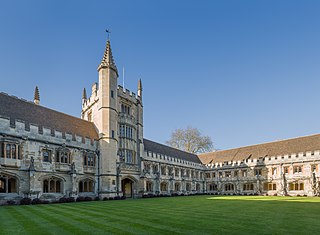
Magdalen College is a constituent college of the University of Oxford. It was founded in 1458 by Bishop of Winchester William of Waynflete. It has the highest total assets of any Oxford college, with £977 million as of 2022, and is one of the strongest academically, setting the record for the highest Norrington Score in 2010 and topping the table twice since then. It is home to several of the university's distinguished chairs, including the Agnelli-Serena Professorship, the Sherardian Professorship, and the four Waynflete Professorships.

Exeter College is one of the constituent colleges of the University of Oxford in England and the fourth-oldest college of the university.

Lady Margaret Hall (LMH) is one of the constituent colleges of the University of Oxford in England, located on a bank of the River Cherwell at Norham Gardens in north Oxford and adjacent to the University Parks. The college is more formally known under its current royal charter as "The Principal and Fellows of the College of the Lady Margaret in the University of Oxford".

Linacre College is a constituent college of the University of Oxford in the UK whose members comprise approximately 50 fellows and 550 postgraduate students.

Oriel College is a constituent college of the University of Oxford in Oxford, England. Located in Oriel Square, the college has the distinction of being the oldest royal foundation in Oxford. In recognition of this royal connection, the college has also been historically known as King's College and King's Hall. The reigning monarch of the United Kingdom is the official visitor of the college.
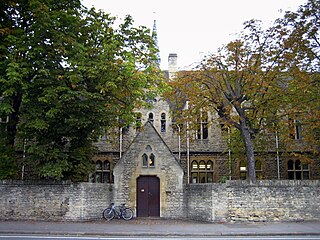
St Antony's College is a constituent college of the University of Oxford in England. Founded in 1950 as the result of the gift of French merchant Sir Antonin Besse of Aden, St Antony's specialises in international relations, economics, politics, and area studies relative to Europe, Russia, former Soviet states, Latin America, the Middle East, Africa, Japan, China, and South and South East Asia.
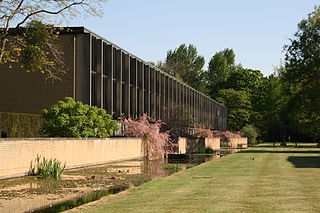
St Catherine's College is one of the constituent colleges of the University of Oxford. In 1974, it was also one of the first men's colleges to admit women. It has 528 undergraduate students, 385 graduate students and 37 visiting students as of December 2020, making it one of the largest colleges in either Oxford or Cambridge.
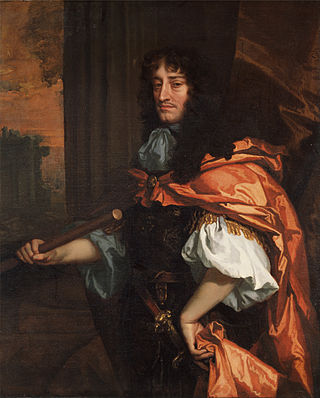
Prince Rupert of the Rhine, Duke of Cumberland, was an English-German army officer, admiral, scientist, and colonial governor. He first came to prominence as a Royalist cavalry commander during the English Civil War. Rupert was the third son of the German Prince Frederick V of the Palatinate and Elizabeth, eldest daughter of King James VI and I of Scotland and England.

Kellogg College is a graduate-only constituent college of the University of Oxford in England. Founded in 1990 as Rewley House, Kellogg is the university's 36th college and the largest by number of students both full and part-time. Named for the Kellogg Foundation, as benefactor, the college hosts research centres including the Institute of Population Ageing and the Centre for Creative Writing. It is closely identified with lifelong learning at Oxford.

Nathaniel Charles Jacob Rothschild, 4th Baron Rothschild,, is a British peer, investment banker and a member of the Rothschild banking family.
Oxford University Labour Club (OULC), currently known as the Oxford Labour Club (OLC), was founded in 1919 to promote democratic socialism and is today the home of the Labour Party and of social democracy at Oxford University. OULC is the largest and oldest university Labour club in the country and has a particular reputation as an active campaigning force.
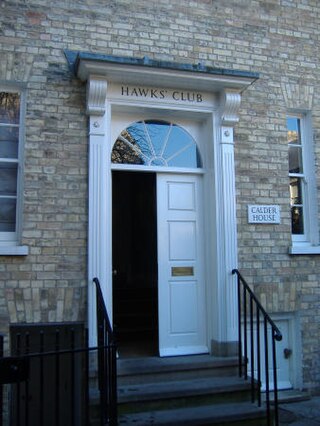
The Hawks' Club, founded in 1872, is a members-only social club for the leading sportsmen at the University of Cambridge. Membership is by election only, and the usual criterion is that the candidate should have his Blue. Many notable individuals have been, or are, members, including King George VI, King Charles III, Rob Andrew, Mike Atherton, Chris Brasher, Gavin Hastings and Hugh Laurie.

James King, 1st Lord Eythin (1589–1652) was a Scottish soldier, who served in the Swedish army, and who later supported King Charles I in the Bishops' Wars, and then later in the English Civil War.

Henry Bard, 1st Viscount Bellomont was a Royalist soldier and diplomat who served in the Wars of the Three Kingdoms, then as envoy from Charles II of England to Safavid Iran and the Mughal Empire, where he died in 1656.
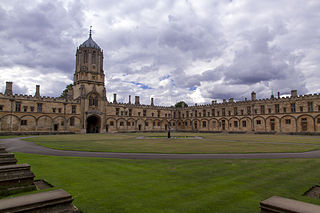
The siege of Oxford comprised the English Civil War military campaigns waged to besiege the Royalist controlled city of Oxford, involving three short engagements over twenty-five months, which ended with a Parliamentarian victory in June 1646.

A loyal toast is a salute given to the sovereign monarch or head of state of the country in which a formal gathering is being given, or by expatriates of that country, whether or not the particular head of state is present. It is usually a matter of protocol at state and military occasions, and a display of patriotic sentiment at civilian events. The toast is usually initiated and recited by the host before being repeated by the assembled guests in unison; the composition varying between regions and types of gathering. There is sometimes a tradition of smashing a glass used for a loyal toast, so that no lesser toast can be made with it.

Gonville and Caius College, often referred to simply as Caius, is a constituent college of the University of Cambridge in Cambridge, England. Founded in 1348 by Edmund Gonville, it is the fourth-oldest of the University of Cambridge's 31 colleges and one of the wealthiest. In 1557, it was refounded by alumnus John Caius. The college has been attended by many students who have gone on to significant accomplishment, including fifteen Nobel Prize winners, the highest of any Oxbridge college.

Jesus College is a constituent college of the University of Cambridge. The college's full name is The College of the Blessed Virgin Mary, Saint John the Evangelist and the glorious Virgin Saint Radegund, near Cambridge. Its common name comes from the name of its chapel, Jesus Chapel.

















